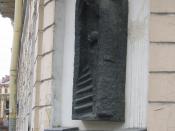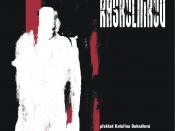In the distinguished novel Crime and Punishment, by Fyodor Dostoyevsky, some of the most significant events are mental and psychological taking place in the mind of the protagonist, Raskolnikov. Throughout Crime and Punishment, Dostoyevsky manages to give these internal events a sense of suspense, excitement, and climax associated with the external action.
The entire novel is purely psychological, primarily internal, "taking the reader on a journey into the darkest recesses of the criminal and depraved mind". As it is revealed later on in the novel, Raskolnikov believes in the theory of the extraordinary man. He theorizes that there are two races of man, the ordinary and the extraordinary, the latter being able to commit crime because they have a gift or talent to utter "a new word". Raskolnikov relies on this fact, presuming that by killing the old pawnbroker he will better society, and mankind as a whole.
These ideas are constantly spoken through the thoughts of Raskolnikov as he questions if he is worthy of being above morality. He says at one point of debating his thoughts, "And what if I am wrong? And what if man is not really a scoundrel, man in general I mean, the whole race of mankind--then all the rest is prejudice, simply artificial terrors and there are no barriers and it's all as it should be".
Raskolnikov experiences salvation at the end of the novel, but before the novel reaches this point Dostoyevsky uses eternal events to create a sense of suspense, excitement, and climax.
Even in the first chapter Dostoyevsky makes great use of suspense. The reader is told on the first page that Raskolnikov is contemplating a "desperate deed", but it is not yet revealed. There are clues given throughout the first chapter as to what the mysterious deed is, such as that it will take place in the pawnbrokers apartment. This slow revelation of details builds on the reader's interest, creating suspense.
After Raskolnikov commits the murder of the pawnbroker he lives in constant fear of being discovered. The scenes that take place directly after the murder produce excitement in the reader. Dostoyevsky builds this excitement with phrases such as ""æperhaps there were a great many stains, but that he did not see them, did not notice them because his perceptions were failing"æSuddenly he remembered that there had been blood on the purse too. Ah! There must be blood on the pocket too!" This phrase, which signifies Raskolnikov being emotionally distraught, excites the reader because he too is excited.
Some of the external events that create the most suspense and excitement are when Raskolnikov is in the office of Porfiry Petrovich, the magistrate in charge of the investigation of the murder. Porfiry hints to Raskolnikov that he is aware that he is the murderer of the pawnbroker, but doesn't come out in the open to say it. For example Porfiry says, "If I leave one man quite alone, if I don't touch him and don't worry him, but let him know or at least suspect every moment that I know all about it and am watching him day and night"æhe'll be bound to lose his head". This statement is Porfiry's method of getting Rashkolnikov to confess, and it is suspenseful and exciting because at this point the reader doesn't know what evidence Porfiry has against him.
Another external event that creates suspense and excitement is when Raskolnikov discovers that the character Svidrigailov has overheard him confessing and could turn him in at any given point. Svidrigailov tells him that he knows by stating to Rashkolnikov ""æyou admit that it's done simply from humanity. She wasn't a louse you know"æthe old pawnbroker woman". At this point Raskolnikov is astonished that anyone else knows of the crime he committed. This creates suspense and excitement in the reader as it is wondered whether or not Svidrigailov will turn him in.
The novel reaches the climax, where the pique of the reader's interest is, at the point that Raskolnikov goes to the police station to turn himself in and confess. At this point, Raskolnikov has reached salvation, realizing that life in a square yard of space is still life. This psychological awakening is reached just before the climax when Rashkolnikov confesses, "It was I killed the old pawnbroker woman and her sister Lizaveta with an ax and robbed them.
Fyodor Dostoyevsky gives the psychological internal events of Raskolnikov's life a sense of excitement, suspense, and climax, as they are associated with external actions in the novel Crime and Punishment.





